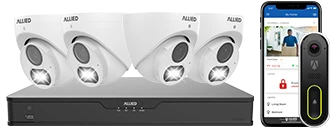The Importance of Alarm Systems for Small Businesses in Houston
In today’s dynamic business environment, securing your small business is paramount. Alarm systems serve as a crucial line of defense against various threats, including theft, vandalism, and unauthorized access. Houston, with its vibrant economy and substantial number of small businesses, necessitates robust security measures to safeguard assets and ensure continuity of operations.
Alarm systems provide multiple benefits for small businesses in Houston:
- Deterrence: A visible alarm system can deter potential criminals, reducing the likelihood of attempted theft or vandalism.
- Immediate Response: Modern alarm systems can alert authorities and business owners of a breach in real-time, allowing for rapid intervention.
- Reduced Losses: By detecting and responding to threats swiftly, alarm systems help minimize potential losses from theft or damage.
- Lower Insurance Premiums: Many insurance companies offer reduced premiums for businesses equipped with certified alarm systems.
Crime Statistics in Houston
Understanding local crime statistics is a vital aspect of recognizing the importance of alarm systems for small businesses. The following table highlights some key statistics relevant to small business security in Houston:
| Crime Type | Incidents Reported (2022) |
|---|---|
| Burglaries | 15,000+ |
| Vandalism | 18,000+ |
| Thefts | 36,000+ |
These statistics underscore the necessity for small businesses in Houston to adopt effective security solutions. An alarm system is not just a preventive measure but an essential tool in mitigating potential risks and maintaining a secure business environment.
Types of Alarm Systems and Their Features
When it comes to protecting your small business in Houston, there are several types of alarm systems available that cater to varying security needs. Understanding the different types can help you make an informed decision based on your business’s requirements and specific risks.
1. Intrusion Alarm Systems:
Intrusion alarm systems are designed to detect unauthorized entry into a building or area. These systems typically include a combination of sensors, control panels, and alarms. Common features include:
- Door and Window Sensors: Detect when doors or windows are opened.
- Motion Detectors: Sense movement within a specified area.
- Glass Break Detectors: Identify the sound of breaking glass.
2. Fire Alarm Systems:
Fire alarm systems are crucial for the safety of employees and the protection of property. They are designed to detect and alert occupants to the presence of fire or smoke. Key components include:
- Smoke Detectors: Sense the presence of smoke.
- Heat Detectors: Detect a rise in temperature indicative of a fire.
- Manual Call Points: Allow occupants to trigger an alarm if they notice a fire.
3. Video Surveillance Systems:
Video surveillance systems provide real-time monitoring and recording of activities in and around business premises. Common features include:
- CCTV Cameras: Fixed or PTZ (pan-tilt-zoom) cameras monitor specific areas.
- Network Video Recorders (NVR): Store and manage video footage.
- Remote Viewing: Access live or recorded video feeds remotely via mobile or desktop applications.
4. Access Control Systems:
Access control systems manage and monitor entry to various parts of the business premises. They can enhance security by restricting unauthorized access. Features include:
- Keycard or Fob Systems: Employees use keycards or fobs to gain entry.
- Biometric Systems: Fingerprint or facial recognition for secure access.
- PIN Code Systems: Users enter a unique code to access restricted areas.
5. Environmental Monitoring Systems:
These systems are designed to protect the business from environmental hazards like water leaks, temperature fluctuations, and humidity. They help in preventing damage to property and goods. Typical features include:
- Water Leak Detectors: Alert when moisture is detected.
- Temperature Sensors: Monitor for abnormal temperature changes.
- Humidity Sensors: Ensure optimal humidity levels are maintained.
Each type of alarm system offers distinct advantages, and many businesses opt for a combination of these systems to create a comprehensive security solution tailored to their specific needs.
Choosing the Right Alarm System for Your Small Business
In selecting an appropriate alarm system for your small business in Houston, it’s essential to consider several key factors. Ensuring that the system aligns with your security needs, budget, and business operations is pivotal. Here are the important elements you should evaluate:
- Business Size and Layout: The scale of your operations and the physical layout of your business premises will influence the type of alarm system you need. Larger spaces may require more sensors, cameras, and advanced monitoring services.
- Security Needs: Assess potential security threats specific to your business type, location, and industry. Retail stores may prioritize theft prevention, while offices may focus on protecting data and sensitive documents.
- Technological Features: Consider the technological aspects such as smart integration, remote access, and real-time alerts. Modern systems may offer advanced options like facial recognition, motion detection, and environmental monitoring.
- Budget: Ensure the alarm system fits within your financial constraints. Account for not just the upfront cost but also ongoing expenses such as subscription fees for monitoring services.
- Customer Support and Maintenance: Reliable customer support and regular maintenance are essential. Look for providers with a strong reputation for service and support.
Below is a table summarizing considerations when choosing an alarm system:
| Consideration | Factors to Evaluate |
|---|---|
| Business Size and Layout | Number of entry points, square footage, and vulnerable areas. |
| Security Needs | Risk assessment, type of risks (e.g., burglary, fire, vandalism). |
| Technological Features | Remote monitoring, smart device integration, real-time alerts. |
| Budget | Installation costs, ongoing fees, potential repairs and upgrades. |
| Customer Support and Maintenance | Service availability, frequency of maintenance checks, provider’s reputation. |
Considering these factors will help you make an informed decision that ensures optimal security for your small business in Houston. It’s crucial to strike a balance between cost and comprehensive coverage to provide adequate protection for your assets and personnel.
Installation and Integration Best Practices
Proper installation and integration of an alarm system are crucial to ensuring its effectiveness in protecting your small business in Houston. The following best practices will help you achieve an optimal setup.
1. Engage Professional Services: Hiring a professional security company to install your alarm system can ensure it is correctly set up. Experienced technicians are familiar with the latest technologies and industry standards, increasing the reliability and efficiency of the system.
2. Comprehensive Site Assessment: Before installation, a thorough site assessment should be conducted. This includes identifying all vulnerable entry points, evaluating existing security measures, and understanding the unique layout of your premises. This assessment helps in designing a tailored security solution.
3. Optimal Placement of Sensors and Cameras: Proper placement of sensors and cameras is critical for maximum coverage. Ensure that door and window sensors are installed on all potential entry points, and position surveillance cameras to cover high-traffic areas, entry points, and blind spots.
4. Integration with Existing Systems: If your business already has other security systems, such as CCTV or access control, ensure that the new alarm system integrates seamlessly with these existing systems. This can provide a more cohesive security strategy and streamline monitoring processes.
5. Regular Maintenance and Testing: Regular maintenance is essential to keep the alarm system in optimal working condition. Schedule periodic checks and tests to ensure all components, such as sensors, alarms, and cameras, are functioning correctly. Address any issues promptly to avoid security lapses.
6. Employee Training: Educate your employees on how to use the alarm system effectively. They should be aware of how to arm and disarm the system, the importance of keeping security codes confidential, and the procedures to follow in the event of an alarm activation. Well-informed staff can significantly enhance the effectiveness of your security measures.
7. Update System Firmware and Software: Ensure that the alarm system’s firmware and software are up to date. Regular updates can provide new features, enhance security, and fix any potential vulnerabilities. Most professional security companies offer support services to manage these updates.
8. Consider Redundancy Measures: Implement redundancy measures to ensure continuous operation of the alarm system. This could include backup power supplies, such as batteries or generators, and failover communication methods like cellular backups if the primary internet connection fails.
By following these best practices, you can maximize the effectiveness of your alarm system, providing robust protection for your small business in Houston. Integrating these measures into your security strategy will help create a safer environment for your operations and staff.
Compliance and Legal Considerations in Houston
Ensuring compliance and understanding legal considerations are crucial when implementing a comprehensive alarm system for your small business in Houston. Adhering to local regulations not only helps avoid penalties but also ensures that your security measures are effective and legally sound. This chapter outlines the key compliance and legal aspects to consider.
Adherence to Local Ordinances
Houston has specific ordinances that govern the installation and operation of alarm systems. These regulations are designed to reduce false alarms and enhance public safety. It is important for business owners to familiarize themselves with the Houston False Alarm Reduction Program, which details requirements and penalties related to false alarms.
- Registration: Businesses must register their alarm systems with the City of Houston’s Administration and Regulatory Affairs department.
- Fees: Registration and permit fees may be required, and these fees can vary based on the type of alarm system installed.
- Renewal: Alarm permits typically need to be renewed annually. Ensuring timely renewal helps to avoid penalties.
Compliance with State Laws
Beyond local ordinances, businesses must also comply with Texas state laws regarding alarm systems. Key regulations include:
- Licensing: Alarm system installers and monitoring companies must be licensed by the Texas Department of Public Safety’s Private Security Board.
- Monitoring: If your alarm system includes monitoring services, ensure that the monitoring company complies with state regulations and maintains the necessary licenses.
- Data Protection: Texas law mandates the proper handling and protection of data collected by your alarm system, including video footage and personal information.
Employee Training and Awareness
Compliance is not just about adhering to legal requirements; it also involves ensuring your staff is well-informed and trained. Proper employee training can help reduce human error and false alarms. Key aspects of training should include:
- System Operation: Training employees on how to operate the alarm system correctly, including arming and disarming procedures.
- Emergency Protocols: Establishing clear protocols for what to do in the event of an alarm, including whom to contact.
- False Alarm Prevention: Educating staff on common causes of false alarms and how to avoid them, such as proper use of entry and exit points.
Insurance Considerations
Having a comprehensive alarm system can impact your business insurance. Many insurance providers offer discounts for businesses that implement robust security measures. It is advisable to:
- Consult with your insurance provider to understand the requirements and benefits related to alarm systems.
- Ensure your system meets or exceeds the standards set by your insurer.
- Keep detailed records of installation, maintenance, and any upgrades to your alarm system.
In conclusion, complying with local ordinances, state laws, and ensuring proper employee training are critical steps in protecting your small business with a comprehensive alarm system in Houston. Meeting these requirements not only helps avoid legal complications but also enhances the overall security and reliability of your alarm system.
Maximizing the Benefits of Your Alarm System
To maximize the benefits of your alarm system, it is crucial to implement strategies that ensure optimal performance and cost-effectiveness. Following a few key steps can significantly enhance the protection provided by your alarm system.
Regular Maintenance: Consistent maintenance of your alarm system is essential. Components like sensors, control panels, and cameras should be routinely inspected and serviced. This helps prevent malfunctions and ensures the system operates efficiently. Most alarm system providers offer maintenance services or maintenance contracts, which can be invaluable in keeping your system in top shape.
User Training: Proper training for all employees on how to use the alarm system is critical. This includes understanding how to arm and disarm the system, responding to alerts, and knowing what to do in case of an emergency. Conducting regular training sessions can help employees stay proficient and reduce human errors.
System Upgrades: Technology evolves rapidly, and so do the capabilities of alarm systems. Periodically review the features of your current system and consider upgrades that offer enhanced security measures, such as advanced motion detectors, better cameras, or integration with smart devices. Staying updated with the latest technology can provide more reliable and comprehensive protection.
Monitoring Services: Utilizing professional monitoring services can significantly enhance the efficiency of your alarm system. These services offer 24/7 monitoring and can quickly alert authorities in the event of a breach. While there is a cost associated with monitoring services, the added layer of security can be invaluable, particularly for small businesses in areas with higher crime rates.
Response Protocols: Establishing clear protocols for responding to alarm triggers can help minimize potential losses and ensure safety. Determine specific actions for different types of alerts, such as contacting law enforcement, notifying security personnel, or conducting an internal investigation. These protocols should be well-documented and regularly reviewed to adapt to any changes in your business operations or security needs.
Environmental Considerations: Be mindful of environmental factors that could affect your alarm system. For instance, extreme weather conditions like hurricanes, which are not uncommon in Houston, can impact system performance. Ensure your alarm system components are rated for such conditions, and take additional protective measures if necessary.
Integration with Other Systems: Maximize the efficiency of your alarm system by integrating it with other security measures like access controls, surveillance cameras, and fire protection systems. Creating a cohesive and comprehensive security network can provide a more robust defense against potential threats and streamline security management.
By focusing on these areas, you can ensure that your alarm system provides the highest level of security for your small business, safeguarding your assets, employees, and peace of mind.












